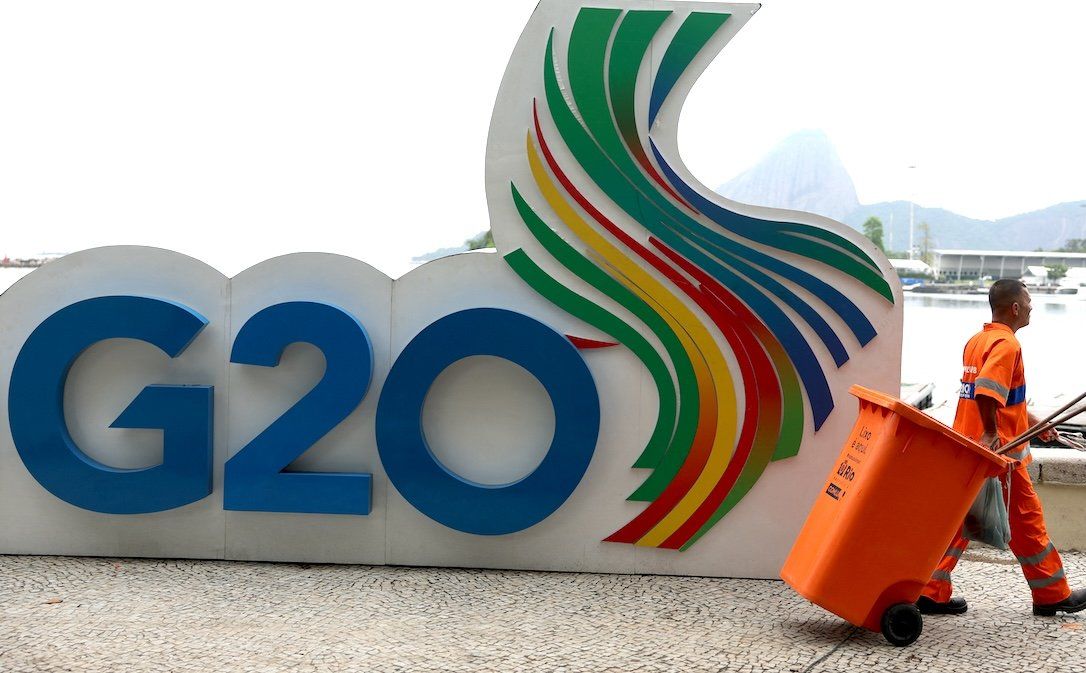Amid geopolitical tensions fanned by wars in Europe and the Middle East and Donald Trump’s reelection in the US, world heads of state will gather in Rio de Janeiro for the G20 Leaders’ Summit from Nov. 18-19. They will discuss proposals to combat global inequality and climate change and try to agree on a common position toward the conflicts in Ukraine and Gaza in a carefully worded closing statement. Following the summit, Brazil’s Luiz Inacio Lula da Silva will host China’s Xi Jinping on a state visit in Brasilia, where the two will announce a series of partnerships in trade and investment.
We sat down with Eurasia Group expert Julia Thomson to learn more about this year’s G20 Summit.
What items would you highlight on the agenda?
Brazil, which holds the G20’s rotating presidency this year, tried to keep divisive geopolitical issues out of the subject matter meetings held in preparation for the summit, allowing for the approval of communiques with policy recommendations on a wide range of issues. I think those related to global inequality, a priority issue for the Brazilian presidency, are likely to get the most attention when the heads of state meet. There are two main proposals: the creation of a new tax on the super-wealthy and the new launch of a Global Alliance Against Hunger and Poverty.
There is not much consensus yet about the tax – what the rate would be, how it would be levied – but the Brazilian presidency considers it a victory to have gotten the issue on the agenda and thinks the proposal can be fleshed out in the coming years. With the Global Alliance Against Hunger and Poverty, Brazil aims to export ideas such as the Bolsa Familia program of cash transfers that have been successful at reducing hunger in Brazil. Thirty-one countries have already signed on to the initiative and another 27 have asked to join.
What impact will Trump’s election have on the summit?
The impact will be greatest on the discussion of climate and sustainability policies, another one of Brazil’s priority areas. Brazil and other emerging market countries have been pressing for assistance in financing climate change mitigation efforts from the wealthy industrialized countries that bear more responsibility for the carbon emissions causing global warming. That already fraught conversation will become much more difficult with Trump, a noted climate skeptic, poised to assume the presidency of the world’s largest economy and second-largest carbon emitter next year. I understand that Lula has been updating his planned speech at the summit to reflect this reality. A silver lining for Brazil is that South Africa, another leading global south country, will assume the G20 presidency next year, so the work done this year on this issue will likely continue.
What do you expect G20 leaders to say about the conflicts in Ukraine and Gaza?
Drafting the final communique, which will have to mention these issues, will obviously present some challenges. There are stark divisions among G20 members about the wars in Ukraine and Gaza. So, the most likely outcome is some vague language about the desirability of peace, as in previous years.
Outside of the G20 agenda, what else do you expect from this gathering of world leaders?
Lula will meet with US President Joe Biden on the sidelines, though Biden’s lame-duck status limits the potential for important outcomes from their conversation. European Commission President Ursula von der Leyen will be at the summit, which creates the opportunity to advance the discussions on a trade pact between the EU and the Mercosur bloc of Latin American countries, which is expected to be finalized in the coming months. But there will be much more focus on Xi Jinping’s follow-up state visit to Brasilia. Chinese officials are expected to announce a slew of investments in sectors of the Brazilian economy ranging from satellites to logistics and infrastructure. Xi will be arriving in Brazil after a stop in Peru to attend the APEC Leaders’ Summit and the inauguration of the Chancay port, which is majority-owned by a Chinese company. There are plans to link this Pacific Ocean-facing port to Brazil to open up a lower-cost trade route to China.
So, it sounds like Lula is expecting some good outcomes. Will that help him politically?
There was more optimism at the beginning of the year, when Lula and his team did not foresee a Trump victory and there was this idea that geopolitical conflicts could have eased by now. Still, Brazil sees hosting the G20 as good for its foreign policy agenda, offering the opportunity to dialogue with the world’s main economies. Brazil sees itself as a non-aligned country striving to maintain good relations with the US, China, and Europe.
Edited by Jonathan House, Senior Editor at Eurasia Group.
